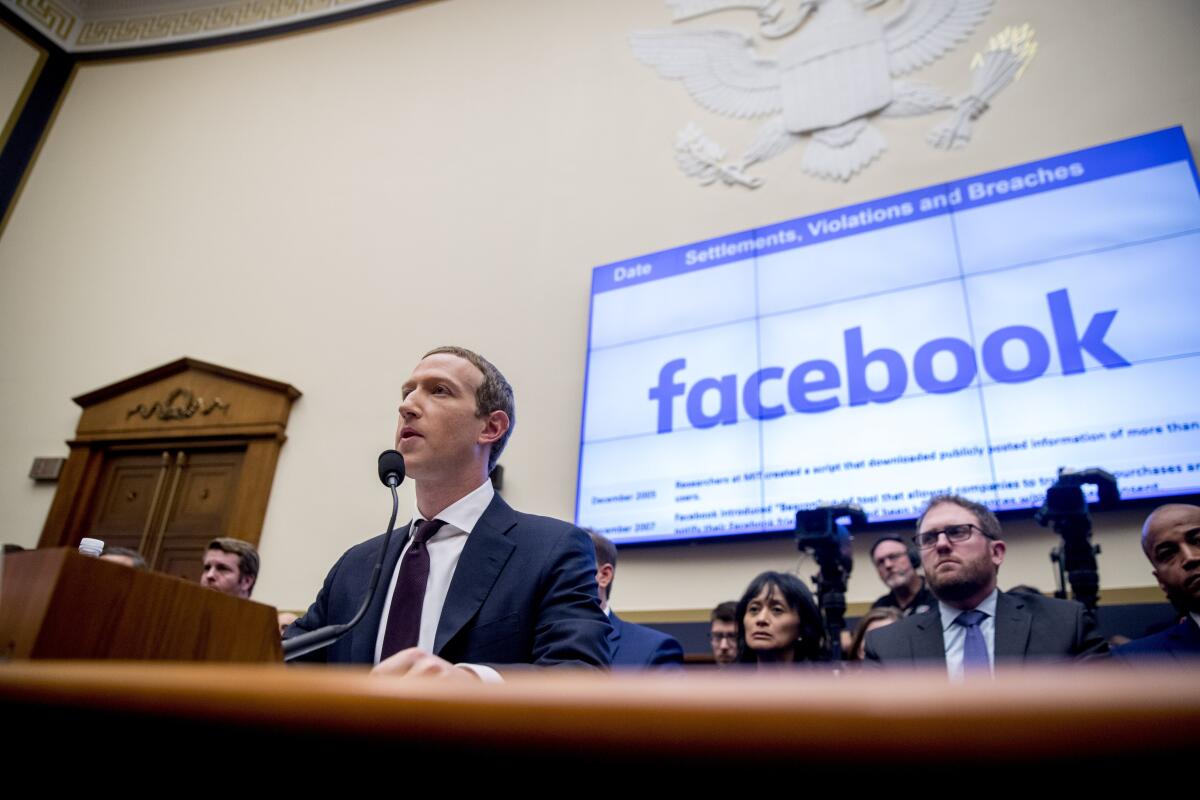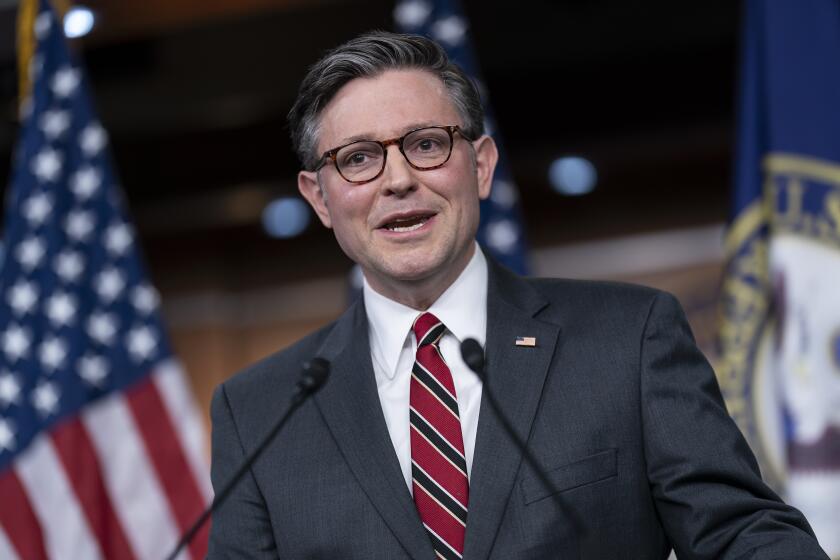A California gubernatorial candidate’s campaign strategy? Lie on Facebook

- Share via
Adriel Hampton may be the most interesting gubernatorial candidate in the country at the moment, no matter how steeply uphill his climb may be.
Hampton, a Democratic political strategist in San Francisco, is what you might call a single-issue candidate. Athough he does have some complaints about Gov. Gavin Newsom, the state Legislature and other policymakers, his main fight is with Facebook, and in particular its policy of allowing politicians and their campaigns to lie in advertisements pumped through the social network.
Hampton formally entered the state’s 2022 gubernatorial race Monday so he could torment Facebook with advertisements that lie. In an interview, Hampton said he planned to target people who have a role to play in cleaning up online political advertising, including Facebook Chief Executive Mark Zuckerberg, Senate Majority Leader Mitch McConnell (R-Ky.) and President Trump. The point is to draw attention to what Hampton sees as a desperate need for a publicly accountable body to set rules for online political speech that would bar the kind of precision-targeted lying that Facebook enables.
He actually fired the first shot before he became a candidate, buying Facebook ads that falsely claimed Sen. Lindsey Graham (R-S.C.) backed the Green New Deal proposal introduced by liberal Democrats. But Facebook took those down, Hampton said, on the grounds that only candidates and their campaigns were free from the third-party fact-checking that Facebook imposed on advertisements. In other words, to lie with impunity on Facebook, you have to be running for office.
But wait — isn’t lying a time-honored practice in political campaigns? It’s not like Trump invented the practice. Hampton’s industry is infamous for taking liberties with the truth, embellishing accomplishments, taking comments out of context, revising history. And as Zuckerberg is fond of pointing out, broadcast TV stations are prohibited by federal law from rejecting candidates’ campaign ads for virtually any reason. So as long as a candidate’s commercial doesn’t violate federal criminal laws, he or she has a standing invitation from broadcasters to lie on their airwaves.
But as Hampton notes, there’s something uniquely manipulative about Facebook’s platform and its ability to direct ads to highly specific subpopulations. For example, he said, he could run a Facebook ad claiming that McConnell was considering impeaching Trump, targeting conservatives “likely to engage with political content” who had a high school education or less — in other words, some of Trump’s most impassioned supporters. “It might make him want to change the rules,” Hampton said.
It also might draw a libel lawsuit, which Facebook would probably be immune to under federal law but Hampton would not. But then, Hampton’s main goal is to light a fire under people like McConnell, and ads like that would get their attention, at least.
The problem is much easier to identify than the solution. If you were designing a system of campaigns and elections from scratch, you wouldn’t build in a powerful amplifier that candidates could use to spread mendacious messages to voters. But now that the amplifier exists in the form of Facebook, its subsidiary Instagram, Twitter and other social networks, what’s the right response to those who try to deceive their way to victory? After all, the 1st Amendment bars the government from trying to prevent a candidate (or anyone else) from lying. Companies could do that on their own by adopting rules against lying, but what standards would they use to judge a false statement of fact from an unpopular opinion?
And to Hampton, that question is crucial. “I don’t think it’s their job to make up these rules,” he said of social media companies; instead, the job needs to be done by elected officials who are accountable to the people. He would have lawmakers, either in Washington or in Sacramento, convene a blue-ribbon panel to come up with a recommendation for how to regulate online ads.
Far be it from me to defend Zuckerberg on this issue. For a company that’s supposedly trying to protect the integrity of elections from fake-news purveyors, which it notably failed to do in 2016, Facebook’s refusal to take down deliberately deceptive posts is disturbing. Yet Zuckerberg is right that social media companies shouldn’t become the gatekeepers to political speech, just as state and federal governments are not allowed to be.
Still, there’s a bright line that can be drawn by social media networks, and it’s epitomized by the doctored video of House Speaker Nancy Pelosi (D-San Francisco) that Facebook declined to remove. If an advertisement is provably false, it shouldn’t run. As the company has done elsewhere on its site, Facebook can use an independent panel of experts to make that judgment or handle appeals of the company’s rulings.
There’s an intensifying drumbeat of protests against Facebook’s see-no-evil policy on candidates’ ads; hundreds of Facebook employees recently sent a letter to Zuckerberg to voice their opposition, as did Sen. Mark Warner (D-Va.):
These protesters are getting in Zuckerberg’s face. Hampton hopes to get under his skin.
More to Read
A cure for the common opinion
Get thought-provoking perspectives with our weekly newsletter.
You may occasionally receive promotional content from the Los Angeles Times.










